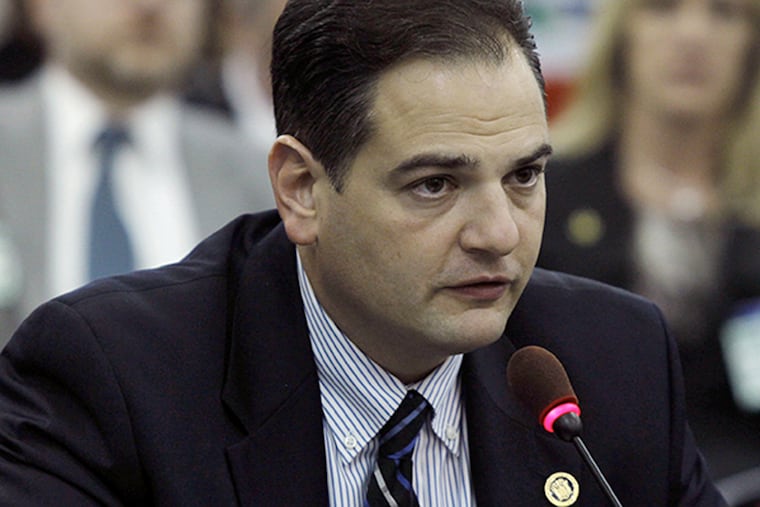On Trenton's agenda: Raises for judges and go-ahead for Christie book
Legislation on the fast track in Trenton would give raises to judges and increase lawmaker staff budgets - while letting Gov. Christie cash in on a book.

Legislation on the fast track in Trenton would give raises to judges and increase lawmaker staff budgets - while letting Gov. Christie cash in on a book.
The bill, which was introduced Monday, is due to get hearings in committees Thursday in both the Senate and the Assembly.
In addition to increasing the salaries for judges and budgets for legislative staff, the bill would raise the maximum salary for most cabinet officers and Board of Public Utilities members to $175,000, which is what the governor is paid.
And it would change state law to allow certain executive branch officers to receive compensation for a book or other published work.
"The governor wants to write a book," said Sen. Nicholas P. Scutari (D., Union), one of the bill's sponsors.
But he said Christie's motivation wasn't the reason for the legislation, which he said was needed to attract and retain judicial talent and legislative staffs.
"We want to make sure the governor is on board and signs it," Scutari said of the book provision. "I don't have a major problem with it."
Christie, whose term ends in January 2018, could write a book regardless after he leaves office, Scutari said.
A spokesman for Christie directed questions to lawmakers. The governor's office generally does not comment "on proposed or pending legislation until a final bill has been submitted and we have had ample time to review it," Brian Murray said.
The Bergen Record reported over the weekend that Christie and lawmakers had reached a deal to pave the way for the governor to profit while in office from a book, while also increasing budgets for legislative salaries.
Current law prohibits the governor and other state officers from receiving any compensation other than pay and reimbursement by the state for performance of official duties, with exceptions for investment income and financial compensation from prior employment.
The law's intent "is to ensure that high-level state officials devote their full time and attention to their official duties and not seek or receive private financial gain from public office," said Paula Franzese, a law professor at Seton Hall University and a former State Ethics Commission chair. It also aims to eliminate the appearance of an official's using a position to gain an unwarranted advantage, Franzese said.
"If there is no advantage to a governor to have his book published while he is still is office, then it is difficult to understand the reasons for the rush to publication," she said. "If there is an advantage to a governor to have his book published while he is still in office, then the reasonable inference is that he is using his official position for his own economic benefit."
The legislation was added Tuesday to the agendas for Thursday's committee hearings. A staffer in the Office of Legislative Services said Tuesday that the office was preparing a fiscal estimate.
The bill would increase the salaries for Supreme Court justices as well as Superior Court judges. The salaries would increase by 3 percent in both 2017 and 2018, with annual automatic increases after that tied to the Consumer Price Index.
There are 443 Superior Court judges. A separate measure introduced this week would increase the number of judges to 463 to support bail system changes and new speedy trial deadlines taking effect in 2017.
The bill would also mean increases for employees with salaries that are linked to salaries of Superior Court judges: workers' compensation judges, administrative law judges, surrogates, county clerks, registers of deeds and mortgages, and sheriffs, according to the legislation.
Also increased would be the annual allowance per lawmaker for member staff services, from $110,000 to $140,000. New Jersey has 40 state senators and 80 Assembly members.
And, certain cabinet officers and Board of Public Utilities members would see their maximum salary raised to $175,000.
State law now sets cabinet salaries at a maximum of $141,000. That would be the new floor for 15 cabinet positions specified in the proposed legislation. The governor would have discretion to set the salaries between the minimum and maximum limits.
Also introduced Monday and scheduled for committee hearings Thursday is a bill that would end the requirement that government agencies publish legal notices in newspapers. Instead, agencies would be permitted to post notices on specific government-notice websites.
The change would make information more accessible and save "significant sums of money," according to a statement accompanying the legislation. Similar legislation has been proposed in the past.
On Tuesday night, the governor's office sent out figures it said were related to the legislation, including a cost estimate to publish legal notices in newspapers and the availability of internet access.
The New Jersey Press Association opposes the change, which it says could cost jobs and spur the shutdown of weekly newspapers. It also says some towns could see personnel and technology costs increase.
The association maintains a website with searchable public notices at njpublicnotices.com.
856-779-3232 @maddiehanna